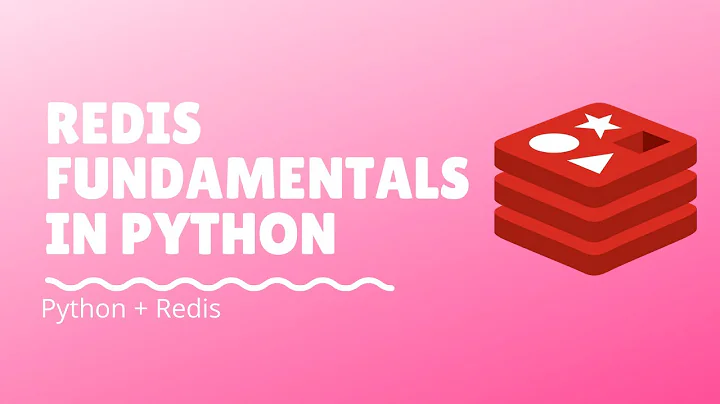How to cache SQL Alchemy calls with Flask-Cache and Redis?
Solution 1
You don't need to create custom RedisCache class. The docs is just teaching how you would create new backends that are not available in flask-cache. But RedisCache is already available in werkzeug >= 0.7, which you might have already installed because it is one of the core dependencies of flask.
This is how I could run the flask-cache with redis backend:
import time
from flask import Flask
from flask_cache import Cache
app = Flask(__name__)
cache = Cache(app, config={'CACHE_TYPE': 'redis'})
@cache.memoize(timeout=60)
def query_db():
time.sleep(5)
return "Results from DB"
@app.route('/')
def index():
return query_db()
app.run(debug=True)
The reason you're getting "ImportError: redis is not a valid FlaskCache backend" is probably because you don't have redis (python library) installed which you can simply install by:
pip install redis.
Solution 2
your redis args would look something like this:
cache = Cache(app, config={
'CACHE_TYPE': 'redis',
'CACHE_KEY_PREFIX': 'fcache',
'CACHE_REDIS_HOST': 'localhost',
'CACHE_REDIS_PORT': '6379',
'CACHE_REDIS_URL': 'redis://localhost:6379'
})
Putting the @cache.memoize over a method that grabs the info from the DB should work.
Related videos on Youtube
bernie2436
Updated on April 02, 2020Comments
-
bernie2436 about 4 years
I have a Flask app that takes parameters from a web form, queries a DB with SQL Alchemy and returns Jinja-generated HTML showing a table with the results. I want to cache the calls to the DB. I looked into Redis (Using redis as an LRU cache for postgres), which led me to http://pythonhosted.org/Flask-Cache/.
Now I am trying to use Redis + Flask-Cache to cache the calls to the DB. Based on the Flask-Cache docs, it seems like I need to set up a custom Redis cache.
class RedisCache(BaseCache): def __init__(self, servers, default_timeout=500): pass def redis(app, config, args, kwargs): args.append(app.config['REDIS_SERVERS']) return RedisCache(*args, **kwargs)From there I would need to something like:
# not sure what to put for args or kwargs cache = redis(app, config={'CACHE_TYPE': 'redis'}) app = Flask(__name__) cache.init_app(app)I have two questions:
What do I put for
argsandkwargs? What do these mean? How do I set up a Redis cache with Flask-Cache?-
Once the cache is set up, it seems like I would want to somehow "memoize" the calls the DB so that if the method gets the same query it has the output cached. How do I do this? My best guess would be to wrap the call the SQL Alchemy in a method that could then be given memoize decorator? That way if two identical queries were passed to the method, Flask-Cache would recognize this and return to the appropriate response. I'm guessing that it would look like this:
@cache.memoize(timeout=50) def queryDB(q): return q.all()
This seems like a fairly common use of Redis + Flask + Flask-Cache + SQL Alchemy, but I am unable to find a complete example to follow. If someone could post one, that would be super helpful -- but for me and for others down the line.
-
ezdazuzena over 9 yearsI encountered the problem that passing a query object as argument yielded memoize using the object's memory address. A wrapping class solved this for. Hope this might help somebody..
-
bernie2436 almost 10 yearsIf I follow this example, I get "ImportError: redis is not a valid FlaskCache backend"
-
bernie2436 almost 10 yearsIf I change CACHE_TYPE to 'redis' I get ERROR:flask_cache:Exception possibly due to cache backend....AttributeError: 'Flask' object has no attribute 'mget'
-
Riz almost 10 yearsMake sure you have the redid python library installed. pip install redis
-
Ctrl-C about 7 years
pip install redisin my case :) Remember that you need to configure redis connection like Riz described in his answer. -
Ronnie Beltran almost 7 yearsNote: Importing flask extension using
from flask flaskt.ext.cache import Cachehas been deprecated use:from flask_cache import Cacheinstead. -
nenur about 4 yearsHow do you set up a Redis host for production (not using localhost as the host)? I'm trying to find a good online guide to get the Redis host set up but can't find anything.






